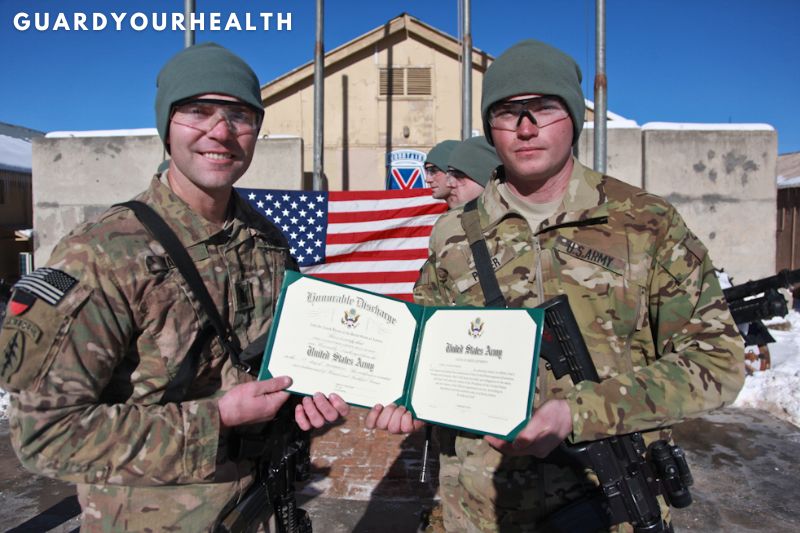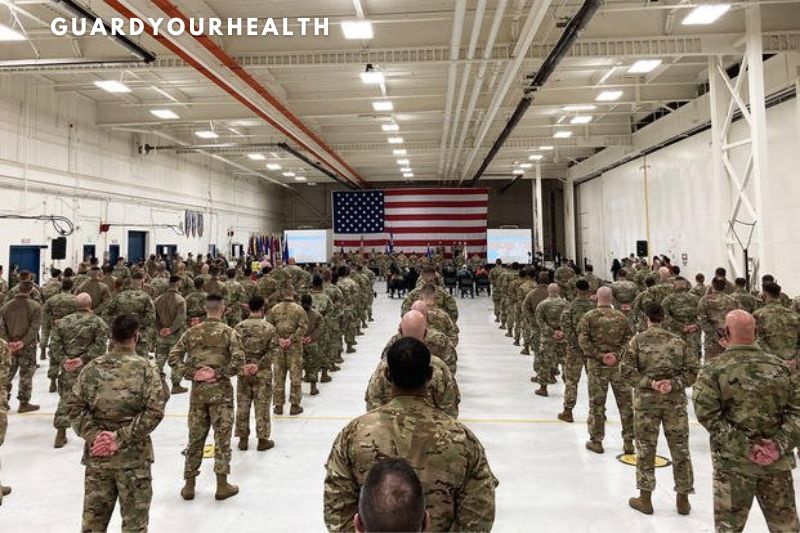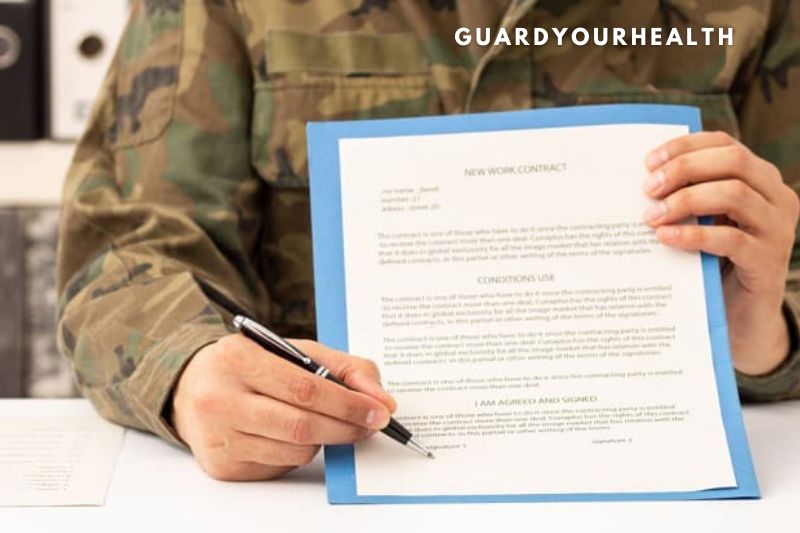If you enlist in the military, you typically sign a contract agreeing to serve for a set amount of time. In some cases, can you buy out your military contract if you no longer wish to serve? The process and requirements for doing so vary by branch of the military, so you will need to research the specifics of your case.
Generally speaking, you will need to have a compelling reason for wanting to leave the military, and you may need to repay some or all of your signing bonus.
Military Commitment Period – What Is It?
This is also known as a service commitment term, and it simply refers to how long a person joins up to serve in the military. Everyone who enlists for the first time is committed to an eight-year term. A member may then choose how long they will serve on active duty. It may be two, three, or four years, with the remaining years (up to eight) covered by the Reserves or National Guard service.
Your commitment time may be longer depending on the job you pick. For example, if you join the Air Force as a pilot, you must fulfill a minimum commitment length of ten years.
Military Discharges – What Are the Types?
1. Involuntary
This essentially indicates you are getting laid off. As strange as it may seem (why would the Government want fewer soldiers to defend it, right?), this is occurring to many members of the military as part of the “Force Downsizing” initiative (Officially, the program is RIF, short for Reduction in Force.)
2. Voluntary
There are situations when it is possible to separate active-duty military personnel early. As an example:
The Air Force’s Palace Chase Program allows you to seamlessly shift to the Air Guard after completing at least half of your first contract. However, it would help if you served twice the time remaining on your Air Guard contract.
3. Honorable Discharge
This is when you have served honorably and parted honorably. It will neutral or positively influence your post-military life, particularly in terms of schooling and professional opportunities.
4. General Discharge
This occurs when you are released for administrative or medical reasons. It may also be used for non-judicial punishment and undesirable conduct.
Other Than Honorable Discharge
This is when you are released due of:
- Broken the law
- Displayed violent actions
- Committed other severe infractions
In this instance, you will most likely be unable to reenlist or return to the military.
It may impact your post-military life, particularly if you are seeking a job requiring background checks.
5. Bad Conduct Discharge (BCD)
This is a discharge from a penalty after a court-martial. You will certainly have to serve in a military jail before being discharged. If you are discharged with this status, you must give up all of your veteran’s benefits. It might have a detrimental impact on your post-military possibilities.
6. Dishonorable Discharge
This discharge form is also given during a court-martial for major acts, including murder, sexual assault, treason, desertion, espionage, and racist behavior. If you get this discharge, you will forfeit all of your veteran’s benefits. You will not be permitted to own or carry guns or ammunition. You will be disqualified from holding public office, serving on juries, or voting in certain places.
7. Dismissal
After a court-martial, an officer cannot be demoted or given poor conduct or dishonorable discharge. Instead, they may be sentenced to “dismissal,” practically the same since it has the same repercussions but with a different name.
Buying Out a Military Contract in the U.S
As previously stated, how much is it to buy out your military contract? Although you cannot buy out a military contract, you may leave the service sooner than the term you joined up for in specific instances.
Conscientious Objector Discharge
A member persuading the military to be a conscientious objector may be discharged. This is not as simple as it seems. To begin, you would need to demonstrate that your views changed dramatically after you enlisted in the military since you must verify that you were not a conscientious objector at the time of your recruitment.
You can’t pick and choose which wars to oppose. A conscientious objector is defined by law as someone who opposes involvement in all conflicts. The person’s objection must be sincerely felt and founded on religious belief and upbringing.
The applicant must demonstrate that once acquired, these moral and ethical beliefs have led their lives in the same manner as conventional religious convictions of similar intensity, depth, and length have directed the lives of others. In other words, the applicant’s principal guiding factor in life must be the belief upon which conscientious objection is founded.
The petitioner has the burden of proving a claim of conscientious objection as grounds for separation.
To that end, applicants must demonstrate, by clear and convincing evidence, that the nature or premise of their claim meets the requirements outlined in DoD Directive 1300.6, Conscientious Objectors, for conscientious objection and that their convictions are genuine.
When evaluating applications for this status, commanders consider relevant factors such as home and church training, general demeanor and pattern of conduct, and participation in religious activities. Whether ethical or moral convictions were gained through training, study, contemplation, or other activity comparable in rigor and dedication to the processes by which traditional religious convictions are formulated; the applicant’s credibility; and the credibility of the presiding officer.
Early Release for Education
If a service person is within 90 days of their customary separation date, Department of Defense Directives enable them to be dismissed early to continue their education.
A service may sometimes grant an educational discharge request for more than 90 days.
For example, Air Force personnel accepted to a recognized institution for medical study as physicians, dentists, osteopaths, veterinarians, optometrists, or clinical psychologists may seek separation after two years of service. Not just any education will suffice.
The Navy Personnel Manual allows sailors to request a discharge for education that lasts more than 90 days; however, the approval authority for a 90-day (or less) discharge is the commanding officer (special court-martial authority), and for discharges that last more than 90 days before the normal separation date, it goes all the way up to the commander of the Navy Personnel Command.
Neither the Army Regulation (AR 635-200) nor the Marine Corps Regulation (MCO P1900-16F) permit educational separations that last longer than 90 days before the customary separation date.
Military Hardship Discharges
Every military has processes for a service member to seek a discharge based on a justifiable hardship. Applicants often discover that they do not qualify. To demonstrate how difficult it may be to qualify, consider the military definition:
The hardship must not be temporary to qualify for separation under this provision. It must have developed or worsened since entering active duty; discharge or release from active duty is the only available means of relief. The individual must have made a reasonable effort to alleviate the conditions through other available and appropriate to the family circumstances.
A hardship discharge would be granted in the event of the death or permanent incapacity of a soldier’s immediate family member, such as the spouse who is the main guardian of the family’s children while the soldier is deployed.
You may be eligible for a humanitarian assignment if you do not qualify for a hardship discharge.
The convenience of the Government
This is a catch-all category for voluntary separations that do not come within the purview of certain programs.
It’s worth noting that it’s dubbed “government convenience,” not “servicemember convenience.”
A discharge to attend a commissioning program is one example. The military may also utilize this provision if it would prefer that you leave but does not have a legal basis under any other separation program.
Another scenario would be winning the state lottery and becoming a multi-millionaire overnight. A 3-striper billionaire coming to work daily in his helicopter would most likely be detrimental to morale and discipline in the armed forces. In such instances, they would certainly grant a release request under the guise of “government convenience.”
Military Service Commitments
A service commitment is a required duration of military service. For example, if you want to be an Air Force pilot, you must agree to a 12-year military commitment after completing pilot school.
Air Force pilot training is very costly, and the Air Force wants to ensure that its investment is repaid.
It may surprise you that everyone who joins the military for the first time must commit to at least eight years of service. Whether you signed a two-year, four-year, or six-year active duty contract makes no difference. Your total military service will last eight years. Whatever time that is not spent on active duty must be spent in either the active Guard/Reserves or the inactive Reserves.
How To Get Out Of The Military Early?
There are numerous ways to be kicked out of the military, but there are also numerous ways to leave the military early and in good standing.
- Discharge for Conscientious Objection
- Early Education Release
- Discharges for Military Hardship
- The Government’s Convenience
To learn more details you can access this article to explore more: How to get out of the military and be successful.
FAQs
How can I get out of my Army contract early?
How do you get out of the military early? GuardYourHealth may seek early separation by submitting a DA Form 4187 to their chain of command (Personnel Action). They should seek assistance from their local career counselor.
Can you break the military contract?
A violation of your enlistment contract may be grounds for voluntarily leaving the military, although this is very unusual. Some individuals feel that uncovering dishonesty on the part of their military recruiter constitutes a breach of contract and grounds for separation.
Can I leave the Army at any time?
You cannot just leave the Army once you are on active service. You are contractually bound to stay in service for your agreed period. However, troops are released from service early owing to medical or psychological incapacity, drug misuse, misbehavior, and other transgressions.
Can the military kick you out for having too much money?
There is nothing in an enlistment contract that requires you to leave the military if you become wealthy. Still, a language permits service members to seek a release under “unusual circumstances.”
How much to buy out the military contract?
The Department of Defense spends billions of dollars on contracts with private companies for a variety of goods and services. In some cases, the government may choose to cancel a contract or not renew it. When this happens, the company may be entitled to a “buyout” from the government. The amount of the buyout depends on the terms of the contract and the reason for the cancellation.
Read more: https://answers.quantarchive.com/question/index?qid=20090909164238AAQLoK9.
Conclusion
Yes, you can buy out your military contract. However, a few things should be kept in mind before doing so.
First, you’ll need to have served at least two years of your contract before you’re eligible to buy out. Second, you’ll need to have a valid reason for wanting to buy out, such as attending college or getting a job. Finally, you’ll need to be able to pay the buyout fee, which is typically several thousand dollars.
If you are interested in other topics, please access our website Guardyourhealth to learn more. Thanks for reading!








